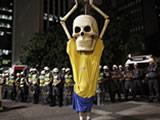Sepp Blatter still insists on a Qatar World Cup despite the loss of 964 lives... it's just the latest blunder by the FIFA chief
Sunday, May 18, 2014 by DailymailAs President of FIFA, Sepp Blatter is by far the most powerful individual in world football. So when he acknowledged that they had made a ‘mistake’ in awarding the 2022 World Cup finals to Qatar, it came as some surprise. He was quite philosophical about the error. ‘You know,’ he said, ‘everyone makes mistakes in life.’
Now, FIFA’s Rapid Response Unit is on full alert whenever Blatter opens his mouth and, within minutes, we were being told that he hadn’t really meant what he had so plainly said, that he was only talking about holding the competition in the heat of high summer and that he certainly wasn’t questioning Qatar’s right to hold the World Cup, heaven forfend.
And some recalled his earlier blunders, such as the time he confronted the issue of racism in football in these words: ‘There is no racism but sometimes there is a word or gesture which is not correct. The one affected by this should say, This is a game and shake hands.’
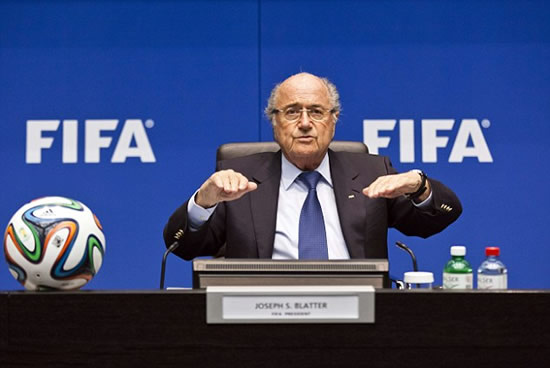
Mistake: Sepp Blatter admitted FIFA made a mistake in awarding Qatar the 2022 World Cup
Or his enlightened suggestion to women footballers: ‘Wear tighter shorts and low-cut shirts.’
Then there was his sensitive advice to those who might be at risk from Qatar’s anti-gay laws: ‘I would say that they should refrain from any sexual activities.’
Blatter has an ability to talk offensive nonsense on a wide range of issues. But that’s just the way he is. He’s 78. Surely he can be forgiven the occasional senior moment?
The truth is, though, he can’t. Because the World Cup finals are destined for Qatar, that impossibly rich and morally bankrupt emirate which held off superior bids from Australia, Korea, Japan and the United States in a Fifa vote which stank to high heaven.
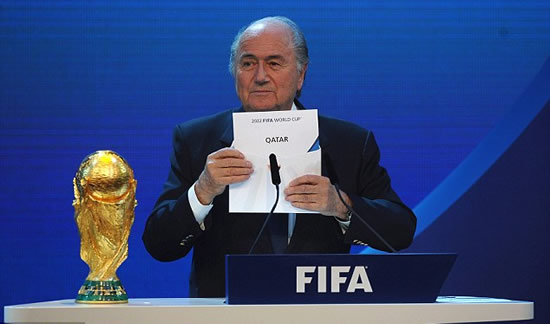
Blunders: Blatter has made a number of remarkable gaffes despite being the most powerful man in football
And yet, that lamentable decision made the wider world aware of Qatar’s savage iniquities.
This is a nation of 2.1million people, 1.4m of whom are migrant workers. It operates the ‘kafala’ system, a form of modern-day slavery by which workers are tied to their employer. Wages are derisory, living conditions are scandalous, passports are confiscated and exit visas withheld.
A report by an international law firm has just quoted the Qatar government’s own statistics on the number of migrants who have died on its soil in 2012 and 2013: no fewer than 964 from Nepal, India and Bangladesh, 246 from ‘sudden cardiac death’ while enduring an inhuman workload in relentless desert heat. While the Qataris say the deaths are not linked to the World Cup, critics insist that fatalities have occurred on infrastructure projects associated with the 2022 tournament.
As a result of this report, along with a good deal of brave and diligent reporting by British and European journalists, the Qatar government have agreed to scrap or soften certain aspects of kafala but their promises are being treated with a degree of cynicism by international human rights agencies.
For the world’s richest nation per capita is also a feudal society which equates mild reform with raging revolution. Let them have exit visas and, next thing you know, they’ll be asking for a living wage. The deal is by no means done. Yet Blatter, back on message, believes that change is on its way. He called it: ‘A significant step in the right direction for sustainable change in the workers’ welfare standards in Qatar.’

Fashion advice: Blatter said women footballers should wear tighter shorts and low-cut tops
Soon, have no doubt, he will claim credit for his organisation’s sagacity in taking the World Cup to this benighted land and thereby hastening its modernisation. For he has served as president since 1998. He has been re-elected on three occasions, with the ominous possibility that he may stand for a fifth term next year. ‘Of course, I want to continue,’ he said. ‘I have the drive to continue’. And he well understands FIFA’s fondness for comforting delusions.
But he, too, has a weakness for delusion. And he does not begin to comprehend the outrage ignited by the very idea of a state such as Qatar staging the ultimate celebration of the most popular sport on the planet. For it fails pretty well every test, save that of extreme wealth. And that is the asset which Blatter and his allies prize most dearly.
It is possible, just possible, to gloss over his racist, sexist and homophobic lapses as the foolish flaws of a bewildered old man. But, on just about every ground one cares to mention, this is an outrage of a quite different order. And he knows it, of course. When he said ‘everyone makes mistakes in life’, he was actually telling the truth.
And he must live with the consequences.
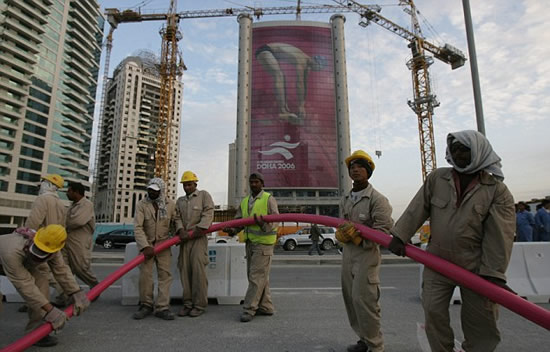
Deaths: 94 migrant workers died on Qatari soil in 2012 and 2013
Chairman Levy gets it wrong... again and again
Daniel Levy stares down from the Tottenham directors’ box, his face as blank as an empty dinner plate. His public statements are rare, unconvincing and usually delivered while washing the blood from his hands after sacking his latest manager.
You will recall: ‘This decision in no way detracts from the excellent work Harry has done during his time with the club’ Harry Redknapp, June 2012. Or: ‘We feel honoured that Martin has been manager at our club’ Martin Jol, October 2007. Or, most recently: ‘I should like to state our thanks for all his efforts during his years with us. We wish him great success in his managerial career’ Tim Sherwood, May 2014.
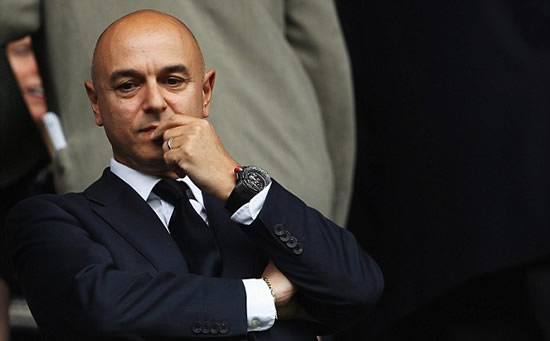
Wrong call: Spurs chairman Daniel Levy has had eight managers in his 13-year spell, but has won just one trophy
In his 13 years as chairman, he has dusted down a version of that speech on nine occasions, as he stuffs their pockets with banknotes and ushers them off the premises. Leave aside George Graham, who he dismissed just a month after assuming the chair, and we find that Levy has hired eight managers, including the so-called ‘caretaker’ David Pleat, and fired them all. Their average tenure was a shade under 20 months.
Each of these men was Levy’s choice and carried Levy’s confidence. Redknapp lasted longest at 44 months, Jol 36 months and Glenn Hoddle 29 months. Sherwood and Jacques Santini stayed for just six months apiece.
In many cases, their arrival and departure involved the hiring and firing of support staffs, with the heavy attendant costs. And the only trophy they have to show for all that expense, all that upheaval, is the League Cup, won in 2008.
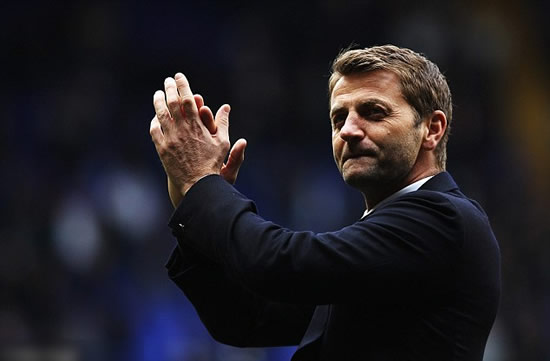
Upheaval: Tim Sherwood was the latest manager to be jettisoned by the Spurs chief
In the past, the chairman has treated his critics with disdain but his latest misadventure may prove a sacking too many. For every time Levy jettisons a manager, he effectively admits that he chose the wrong man.
When people like Sherwood, Santini, Pleat and Juande Ramos are sent packing after less than a year in the post, those admissions become damning.
The manager is the single most important appointment that a club chairman makes, yet Levy’s record reads like a string of errors. Imagine the reaction of shareholders if the chairman of a public company were to make a similar number of misjudgments when choosing chief executives.
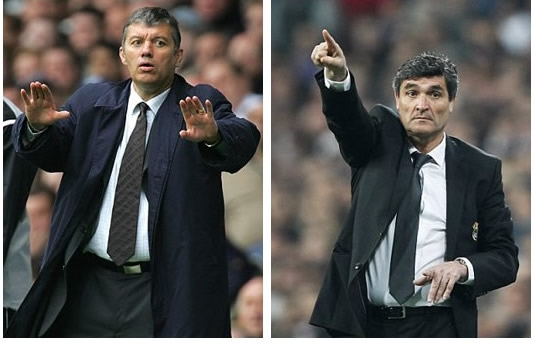
Damning: Four of Levy's eight managerial appointments, including Jacques Santini (left) and Juande Ramos (right), have lasted less than a year in charge at White Hart Lane
The man who holds the real power at Spurs is the absentee owner and billionaire tax exile, Joe Lewis. One wonders how he feels about so much blood-letting, so much expenditure, so much shabby chaos, and all for so little reward?
After 13 years of Chairman Levy, the Tottenham followers surely deserve an answer.

Legends pay tribute to Gerrard & Lahm
International retirements follow Wo...
- Year
- Winner
- Runner-up
- Third place



